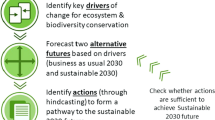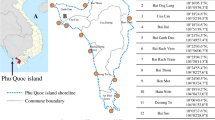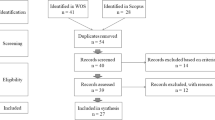Abstract
Previous researchers have made efforts to link the limitations and values of coral and oyster reefs to coastal defence. However, given the context in which reef ecosystems interact with changing climate and human behaviours, synthesising the available information is necessary to know the status and actions needed to improve the situation. To comprehend and advance this field, we used a detailed review approach to examine 84 relevant previous papers to provide a comprehensive overview of the existing state of knowledge of the values and limitations of coral and oyster reefs in coastal disaster risk reduction. The results show that the literature on the economic valuation of oyster reefs in coastal disaster risk reduction is in its infancy and therefore needs more attention. Due to the lower threshold of environmental tolerance of corals, the ongoing and projected global warming circumstances will put coral reefs more at risk than oyster reefs. The severity of the associated consequences for humans will depend on socioeconomic disparity and poor governance among coastal communities. Individuals who rely on climate-susceptible livelihoods will suffer the most. The authors recommend collaborative studies involving local governments to investigate the possibility of making payment for the services of these organisms a requirement for living near them. Additionally, simulation and modelling studies on the reactions of corals and oyster reefs to short, medium, and long-term projected climate change and human influences are necessary.

Source: (Ferrario et al., 2014)

Source: Authors’ illustration: The arrows show a negative relationship. Each of the factors shown in the diagram can independently harm coral reefs. However, in most circumstances, one issue may lead to or combine with another, resulting in the imminent destruction of the organisms

Source: Authors’ illustration: Arrows show the progression of or combination of independently harmful factors
Similar content being viewed by others
Data availability
Not applicable.
Code availability
Not applicable.
References
Alvarez-Filip, L., Côté, I. M., Gill, J. A., Watkinson, A. R., & Dulvy, N. K. (2011). Region-wide temporal and spatial variation in Caribbean reef architecture: Is coral cover the whole story? Global Change Biology, 17(7), 2470–2477. https://doi.org/10.1111/j.1365-2486.2010.02385.x
Barbier, E. B. (2017). Marine ecosystem services. Elsevier. https://www.sciencedirect.com/science/article/pii/S0960982217302890
Beck, M. W., Brumbaugh, R. D., Airoldi, L., Carranza, A., Coen, L. D., Crawford, C., Defeo, O., Edgar, G. J., Hancock, B., Kay, M. C., Lenihan, H. S., Luckenbach, M. W., Toropova, C. L., Zhang, G., & Guo, X. (2011). Oyster reefs at risk and recommendations for conservation, restoration, and management. BioScience, 61(2), 107–116. https://doi.org/10.1525/bio.2011.61.2.5
Beck, M. W., Losada, I. J., Menéndez, P., Reguero, B. G., Díaz-Simal, P., & Fernández, F. (2018). The global flood protection savings provided by coral reefs. Nature Communications. https://doi.org/10.1038/s41467-018-04568-z
Blomberg, B. N., Pollack, J. B., Montagna, P. A., & Yoskowitz, D. W. (2018). Evaluating the U.S. Estuary Restoration Act to inform restoration policy implementation: A case study focusing on oyster reef projects. Marine Policy, 91, 161–166. https://doi.org/10.1016/j.marpol.2018.02.014
Brathwaite, A., Pascal, N., & Clua, E. (2021). When are payment for ecosystems services suitable for coral reef derived coastal protection?: A review of scientific requirements. Ecosystem Services. https://doi.org/10.1016/j.ecoser.2021.101261
Brown, B. E., & Dunne, R. P. (1988). The environmental impact of coral mining on coral reefs in the Maldives. Environmental Conservation, 15(2), 159–165. https://doi.org/10.1017/S0376892900028976
Bruno, J. F., Bates, A. E., Cacciapaglia, C., Pike, E. P., Amstrup, S. C., van Hooidonk, R., Henson, S. A., & Aronson, R. B. (2018). Climate change threatens the world’s marine protected areas. Nature Climate Change, 8(6), 499–503. https://doi.org/10.1038/s41558-018-0149-2
Carroll, J. M., Dashiell, R., Watts, J. C., & Hunter, E. A. (2021). Tidal level affects the prevalence and impacts of pests and parasites on oysters (Crassostrea virginica) on intertidal reefs in Georgia, USA. Marine Biology, 168(4), 1–11. https://doi.org/10.1007/s00227-021-03848-5
Claar, D. C., Szostek, L., McDevitt-Irwin, J. M., Schanze, J. J., & Baum, J. K. (2018). Global patterns and impacts of El Niño events on coral reefs: A meta-analysis. PLoS One, 13(2), e0190957. https://doi.org/10.1371/journal.pone.0190957
Cook, P. A., Warnock, B., Gillies, C. L., & Hams, A. B. (2022). Historical abundance and distribution of the native flat oyster (Ostrea angasi) in estuaries of the Great Southern region of Western Australia help to prioritise potential sites for contemporary oyster reef restoration. Marine and Freshwater Research, 73(1), 48. https://doi.org/10.1071/MF21058
Cuttler, M. V. W., Hansen, J. E., Lowe, R. J., & Drost, E. J. F. (2018). Response of a fringing reef coastline to the direct impact of a tropical cyclone. Limnology and Oceanography Letters, 3(2), 31–38. https://doi.org/10.1002/lol2.10067
Daley, B. (2018). Hurricanes and water wars threaten the Gulf Coast’s new high-end oyster industry. In The Conversation. Retrieved from https://theconversation.com/hurricanes-and-water-wars-threaten-the-gulf-coasts-new-high-end-oyster-industry-105479
Donaghy, L., Hong, H.-K., Lee, H.-J., Jun, J.-C., Park, Y.-J., & Choi, K.-S. (2010). Hemocyte parameters of the Pacific oyster Crassostrea gigas a year after the Hebei Spirit oil spill off the west coast of Korea. Helgoland Marine Research, 64(4), 349–355. https://doi.org/10.1007/S10152-010-0190-7
Douglas, A. (2020). Coral reef case study: Comparing current international and domestic coral reef laws and diving into the legal inplications of countries failing to adequately protect and conserve these ecosystems as climate change worsens. South Carolina Journal of International Law and Business, 16(3), 9.
Du, J., Park, K., Jensen, C., Dellapenna, T. M., Zhang, W. G., & Shi, Y. (2021). Massive oyster kill in Galveston Bay caused by prolonged low-salinity exposure after Hurricane Harvey. Science of the Total Environment, 774, 145132. https://doi.org/10.1016/j.scitotenv.2021.145132
Duarte, C. M., Agusti, S., Barbier, E., Britten, G. L., Castilla, J. C., Gattuso, J. P., Fulweiler, R. W., Hughes, T. P., Knowlton, N., Lovelock, C. E., Lotze, H. K., Predragovic, M., Poloczanska, E., Roberts, C., & Worm, B. (2020). Rebuilding marine life. Nature, 580(7801), 39–51. https://doi.org/10.1038/s41586-020-2146-7
Duarte, C. M., Losada, I. J., Hendriks, I. E., Mazarrasa, I., & Marbà, N. (2016). Erratum: The role of coastal plant communities for climate change mitigation and adaptation (Nature Climate Change (2013) 3 (961–968)). Nature Climate Change, 6(8), 802. https://doi.org/10.1038/nclimate3062
Eastwood, E. K., Clary, D. G., & Melnick, D. J. (2017). Coral reef health and management on the verge of a tourism boom: A case study from Miches, Dominican Republic. Ocean and Coastal Management, 138, 192–204. https://doi.org/10.1016/j.ocecoaman.2017.01.023
Fariñas-Franco, J. M., Pearce, B., Mair, J. M., Harries, D. B., MacPherson, R. C., Porter, J. S., Reimer, P. J., & Sanderson, W. G. (2018). Missing native oyster (Ostrea edulis L.) beds in a European Marine Protected Area: Should there be widespread restorative management? Biological Conservation, 221, 293–311. https://doi.org/10.1016/j.biocon.2018.03.010
Ferrario, F. (2013). Analysis and development of ecologically based approaches to coastal defense. https://doi.org/10.6092/unibo/amsdottorato/5831
Ferrario, F., Beck, M. W., Storlazzi, C. D., Micheli, F., Shepard, C. C., & Airoldi, L. (2014). The effectiveness of coral reefs for coastal hazard risk reduction and adaptation. Nature Communications, 5(1), 3794. https://doi.org/10.1038/ncomms4794
Gilmour, J. P., Cook, K. L., Ryan, N. M., Puotinen, M. L., Green, R. H., Shedrawi, G., Hobbs, J.-P.A., Thomson, D. P., Babcock, R. C., Buckee, J., Foster, T., Richards, Z. T., Wilson, S. K., Barnes, P. B., Coutts, T. B., Radford, B. T., Piggott, C. H., Depczynski, M., Evans, S. N., & Oades, D. (2019). The state of Western Australia’s coral reefs. Coral Reefs, 38(4), 651–667. https://doi.org/10.1007/s00338-019-01795-8
Grabowski, J. H., Brumbaugh, R. D., Conrad, R. F., Keeler, A. G., Opaluch, J. J., Peterson, C. H., Piehler, M. F., Powers, S. P., & Smyth, A. R. (2012). Economic valuation of ecosystem services provided by oyster reefs. BioScience, 62(10), 900–909. https://doi.org/10.1525/bio.2012.62.10.10
Griggs, G., & Reguero, B. G. (2021). Coastal adaptation to climate change and sea-level rise. Water, 13(16), 2151. https://doi.org/10.3390/w13162151
Guannel, G., Arkema, K., Ruggiero, P., & Verutes, G. (2016). The power of three: Coral reefs, seagrasses and mangroves protect coastal regions and increase their resilience. PLoS ONE, 11(7), e0158094. https://doi.org/10.1371/journal.pone.0158094
Hughes, T. P., Anderson, K. D., Connolly, S. R., Heron, S. F., Kerry, J. T., Lough, J. M., Baird, A. H., Baum, J. K., Berumen, M. L., Bridge, T. C., Claar, D. C., Eakin, C. M., Gilmour, J. P., Graham, N. A. J., Harrison, H., Hobbs, J.-P.A., Hoey, A. S., Hoogenboom, M., Lowe, R. J., & Wilson, S. K. (2018). Spatial and temporal patterns of mass bleaching of corals in the Anthropocene. Science, 359(6371), 80–83. https://doi.org/10.1126/science.aan8048
IPCC. (2022). Climate Change 2022: Impacts, Adaptation, and Vulnerability Working Group II Contribution to the Sixth Assessment Report of the Intergovernmental Panel on Climate Change. Retrieved from https://www.ipcc.ch/report/ar6/wg2/downloads/
Jesse, J. A., Agnew, M. V., Arai, K., Armstrong, C. T., Hood, S. M., Kachmar, M. L., Long, J. T., McCarty, A. J., Ross, M. O., Rubalcava, K. D., Shaner, J., Tanaka, S., Wood, L., Schott, E. J., & Wilberg, M. J. (2021). Effects of infectious diseases on population dynamics of marine organisms in Chesapeake Bay. Estuaries and Coasts. https://doi.org/10.1007/s12237-021-00915-4
Joy, A., & Gopinath, A. (2021). The application of reefs in shoreline protection. Handbook of ecological and ecosystem engineering. Wiley. https://doi.org/10.1002/9781119678595.ch16
Kenchington, R. A., & Day, J. C. (2011). Zoning, a fundamental cornerstone of effective Marine Spatial Planning: Lessons learnt from the Great Barrier Reef, Australia. Journal of Coastal Conservation, 15(2), 271–278. https://doi.org/10.1007/s11852-011-0147-2
Kininmonth, S., Lemm, S., Malone, C., & Hatley, T. (2014). Spatial vulnerability assessment of anchor damage within the Great Barrier Reef World Heritage Area, Australia. Ocean and Coastal Management, 100, 20–31. https://doi.org/10.1016/j.ocecoaman.2014.07.003
Kleypas, J., & Yates, K. (2009). Coral reefs and ocean acidification. Oceanography, 22(4), 108–117. https://doi.org/10.5670/oceanog.2009.101
Kyzar, T., Safak, I., Cebrian, J., Clark, M. W., Dix, N., Dietz, K., Gittman, R. K., Jaeger, J., Radabaugh, K. R., Roddenberry, A., Smith, C. S., Sparks, E. L., Stone, B., Sundin, G., Taubler, M., & Angelini, C. (2021). Challenges and opportunities for sustaining coastal wetlands and oyster reefs in the southeastern United States. Journal of Environmental Management, 296, 113178. https://doi.org/10.1016/j.jenvman.2021.113178
Laing, S. C. S., Schleyer, M. H., & Turpie, J. K. (2020). Ecosystem service values of sediment generation and entrapment by marginal coral reefs at Sodwana Bay, South Africa. African Journal of Marine Science, 42(2), 199–207. https://doi.org/10.2989/1814232X.2020.1771415
le Grel, L., & le Bihan, V. (2009). Oyster farming and externalities: The experience of the Bay of Bourgneuf. Aquaculture Economics & Management, 13(2), 112–123. https://doi.org/10.1080/13657300902881690
Luter, H. M., Whalan, S., Andreakis, N., Abdul Wahab, M., Botté, E. S., Negri, A. P., & Webster, N. S. (2019). The effects of crude oil and dispersant on the larval sponge holobiont. Msystems. https://doi.org/10.1128/msystems.00743-19
McClanahan, T. R., Hicks, C. C., & Darling, E. S. (2008). Malthusian overfishing and efforts to overcome it on Kenyan coral reefs. Ecological Applications, 18(6), 1516–1529. https://doi.org/10.1890/07-0876.1
McGuire, T. (2006). Louisiana’s Oysters, America’s Wetlands, and the Storms of 2005. American Anthropologist, 108(4), 692–705. https://doi.org/10.1525/aa.2006.108.4.692
McManus, J. (2000). Coral reef fishing and coral-algal phase shifts: Implications for global reef status. ICES Journal of Marine Science, 57(3), 572–578. https://doi.org/10.1006/jmsc.2000.0720
Moreira, A., Figueira, E., Pecora, I. L., Soares, A. M. V. M., & Freitas, R. (2017). Biochemical alterations in native and exotic oyster species in Brazil in response to increasing temperature. Comparative Biochemistry and Physiology Part C: Toxicology & Pharmacology, 191, 183–193. https://doi.org/10.1016/j.cbpc.2016.10.008
Mortensen, S., Dolmer, P., Strand, Å., Naustvoll, L.-J., & Laugen, A. T. (2019). The Pacific oyster—A new Nordic food resource and a basis for tourism. Nordic Council of Ministers. https://doi.org/10.6027/Nord2019-015
Nichols, C. R., Zinnert, J., & Young, D. R. (2019). Degradation of coastal ecosystems: Causes, impacts and mitigation efforts. Coastal Research Library, 27, 119–136. https://doi.org/10.1007/978-3-319-75453-6_8
Pickering, T. R., Poirier, L. A., Barrett, T. J., McKenna, S., Davidson, J., & Quijón, P. A. (2017). Non-indigenous predators threaten ecosystem engineers: Interactive effects of green crab and oyster size on American oyster mortality. Marine Environmental Research, 127, 24–31. https://doi.org/10.1016/j.marenvres.2017.03.002
Plottu, E., & Plottu, B. (2007). The concept of total economic value of environment: A reconsideration within a hierarchical rationality. Ecological Economics, 61(1), 52–61. https://doi.org/10.1016/j.ecolecon.2006.09.027
Porter, J. W., Barton, J. V., & Torres, C. (2011). Ecological, radiological, and toxicological effects of naval bombardment on the coral reefs of Isla de Vieques, Puerto Rico. NATO Science for Peace and Security Series C: Environmental Security, 113, 65–122. https://doi.org/10.1007/978-94-007-1214-0_8
Powers, S. P., Peterson, C. H., Grabowski, J. H., & Lenihan, H. S. (2009). Success of constructed oyster reefs in no-harvest sanctuaries: Implications for restoration. Marine Ecology Progress Series, 389, 159–170. https://doi.org/10.3354/meps08164
Rani, S., Ahmed, M. K., Xiongzhi, X., Yuhuan, J., Keliang, C., & Islam, M. M. (2020). Economic valuation and conservation, restoration & management strategies of Saint Martin’s Coral Island. Bangladesh. Ocean & Coastal Management, 183, https://doi.org/10.1016/j.ocecoaman.2019.105024.
Ritchie, B. W., Prideaux, B., Thompson, M., & Demeter, C. (2021). Understanding tourists’ attitudes toward interventions for the Great Barrier Reef: An extension of the norm activation model. Journal of Sustainable Tourism. https://doi.org/10.1080/09669582.2021.1948048
Schuhmann, P. W., & Mahon, R. (2015). The valuation of marine ecosystem goods and services in the Caribbean: A literature review and framework for future valuation efforts. Ecosystem Services, 11, 56–66. https://doi.org/10.1016/j.ecoser.2014.07.013
Scircle, A., Cizdziel, J. V., Tisinger, L., Anumol, T., & Robey, D. (2020). Occurrence of microplastic pollution at oyster reefs and other coastal sites in the Mississippi sound, USA: Impacts of freshwater inflows from flooding. Toxics, 8(2), 35. https://doi.org/10.3390/TOXICS8020035
Spalding, M. D., Ruffo, S., Lacambra, C., Meliane, I., Hale, L. Z., Shepard, C. C., & Beck, M. W. (2014). The role of ecosystems in coastal protection: Adapting to climate change and coastal hazards. Ocean and Coastal Management, 90, 50–57. https://doi.org/10.1016/j.ocecoaman.2013.09.007
Storlazzi, C. D., Reguero, B. G., Cole, A. D., Lowe, E., Shope, J. B., Gibbs, A. E., Nickel, B. A., McCall, R. T., van Dongeren, A. R., & Beck, M. W. (2019). Rigorously Valuing the Role of U.S. Coral Reefs in Coastal Hazard Risk Reduction: U.S. Geological Survey Open-File Report 2019–1027. Open-File Report, April, 42. https://doi.org/10.3133/OFR20191027
Sussarellu, R., Suquet, M., Thomas, Y., Lambert, C., Fabioux, C., Pernet, M. E. J., le Goïc, N., Quillien, V., Mingant, C., Epelboin, Y., Corporeau, C., Guyomarch, J., Robbens, J., Paul-Pont, I., Soudant, P., & Huvet, A. (2016). Oyster reproduction is affected by exposure to polystyrene microplastics. Proceedings of the National Academy of Sciences of the United States of America, 113(9), 2430–2435. https://doi.org/10.1073/pnas.1519019113
Tebbett, S. B., Morais, R. A., Goatley, C. H. R., & Bellwood, D. R. (2021). Collapsing ecosystem functions on an inshore coral reef. Journal of Environmental Management, 289, 112471. https://doi.org/10.1016/j.jenvman.2021.112471
UNDRR. (2022). United Nations Office for Disaster Risk Reduction| Terminology. https://www.undrr.org/terminology
Uyarra, M. C., Watkinson, A. R., & Côté, I. M. (2009). Managing Dive tourism for the sustainable use of coral reefs: Validating diver perceptions of attractive site features. Environmental Management, 43(1), 1–16. https://doi.org/10.1007/s00267-008-9198-z
Vogel, N., Meyer, F. W., Wild, C., & Uthicke, S. (2015). Decreased light availability can amplify negative impacts of ocean acidification on calcifying coral reef organisms. Marine Ecology Progress Series, 521, 49–61. https://doi.org/10.3354/meps11088
Volety, A. K. (2008). Effects of salinity, heavy metals and pesticides on health and physiology of oysters in the Caloosahatchee Estuary, Florida. Ecotoxicology, 17(7), 579–590. https://doi.org/10.1007/s10646-008-0242-9
Walles, B., Troost, K., van den Ende, D., Nieuwhof, S., Smaal, A. C., & Ysebaert, T. (2016). From artificial structures to self-sustaining oyster reefs. Journal of Sea Research, 108, 1–9. https://doi.org/10.1016/j.seares.2015.11.007
Walters, L. J., Sacks, P. E., & Campbell, D. E. (2020). Boating impacts and boat-wake resilient restoration of the eastern oyster Crassostrea virginica in Mosquito Lagoon, Florida, USA.
White, A. T., Vogt, H. P., & Arin, T. (2000). Philippine Coral Reefs Under Threat: The Economic Losses Caused by Reef Destruction. Marine Pollution Bulletin, 40(7), 598–605. https://doi.org/10.1016/S0025-326X(00)00022-9.
Wiberg, P. L., Taube, S. R., Ferguson, A. E., Kremer, M. R., & Reidenbach, M. A. (2019). Wave Attenuation by oyster reefs in shallow coastal bays. Estuaries and Coasts, 42(2), 331–347. https://doi.org/10.1007/s12237-018-0463-y
Xu, Y., Zhang, Y., Liang, J., He, G., Liu, X., Zheng, Z., Le, D. Q., Deng, Y., & Zhao, L. (2021). Impacts of marine heatwaves on pearl oysters are alleviated following repeated exposure. Marine Pollution Bulletin, 173, 112932. https://doi.org/10.1016/j.marpolbul.2021.112932
Funding
All authors received no funding for this research.
Author information
Authors and Affiliations
Corresponding author
Ethics declarations
Conflict of interest
The authors declare that there is no conflict of interest.
Ethical approval and consent to participate
Not applicable.
Consent for publication
All the authors read the final manuscript and agreed to submit it to this journal.
Additional information
Publisher's Note
Springer Nature remains neutral with regard to jurisdictional claims in published maps and institutional affiliations.
Rights and permissions
Springer Nature or its licensor (e.g. a society or other partner) holds exclusive rights to this article under a publishing agreement with the author(s) or other rightsholder(s); author self-archiving of the accepted manuscript version of this article is solely governed by the terms of such publishing agreement and applicable law.
About this article
Cite this article
Turay, B., Conteh, I. & Gbetuwa, S. Evaluating the values and limitations for coral and oyster reefs in coastal disaster risk reduction: a literature review. Environ Dev Sustain (2024). https://doi.org/10.1007/s10668-024-04582-w
Received:
Accepted:
Published:
DOI: https://doi.org/10.1007/s10668-024-04582-w




